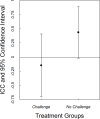Examining the role of testosterone in mediating short-term aggressive responses to social stimuli in a lizard
- PMID: 25906149
- PMCID: PMC4407986
- DOI: 10.1371/journal.pone.0125015
Examining the role of testosterone in mediating short-term aggressive responses to social stimuli in a lizard
Abstract
Hormones have been suggested as a key proximate mechanism that organize and maintain consistent individual differences in behavioural traits such as aggression. The steroid hormone testosterone in particular has an important activational role in mediating short-term aggressive responses to social and environmental stimuli within many vertebrate systems. We conducted two complementary experiments designed to investigate the activational relationship between testosterone and aggression in male Egernia whitii, a social lizard species. First, we investigated whether a conspecific aggressive challenge induced a testosterone response and second, we artificially manipulated testosterone concentrations to examine whether this changed aggression levels. We found that at the mean level, plasma T concentration did not appear to be influenced by an aggression challenge. However, there was a slight indication that receiving a challenge may influence intra-individual consistency of plasma T concentrations, with individuals not receiving an aggression challenge maintaining consistency in their circulating testosterone concentrations, while those individuals that received a challenge did not. Manipulating circulating testosterone concentrations had no influence on either mean-level or individual-level aggression. Combined with our previous work, our study adds increasing evidence that the relationship between testosterone and aggression is not straightforward, and promotes the investigation of alternative hormonal pathways and differences in neuro-synthesis and neuroendocrine pathways to account for species variable testosterone - aggression links.
Conflict of interest statement
Figures



References
-
- Dall SRX, Houston AI, McNamara JM (2004) The behavioural ecology of personality: consistent individual differences from an adaptive perspective. Ecol. Lett. 7: 734–739.
-
- Bell AM (2007) Evolutionary biology—Animal personalities. Nature 447, 539–540. - PubMed
Publication types
MeSH terms
Substances
LinkOut - more resources
Full Text Sources
Other Literature Sources

